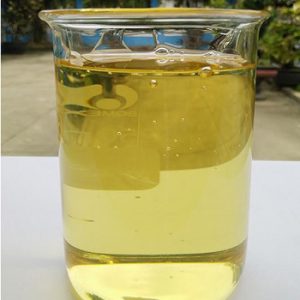
Alkyd Resin

Specifications
Alkyd resin for wood paint and nitro-lacquer
| Model | Oil type | Oil length | Solid content,% | Viscosity,mpa.s | Color | Acid value,mg/KOH/g | Hydroxyl value |
| 3370DS | Soya oil acid | 35 | 70±1 | 13000-25000 | 5 | 15 | 90 |
| 3370D-1 | Soya oil acid | 30 | 70±1 | 50000-80000 | 3 | 12 | 100 |
| 3370D-2 | Soya oil acid | 33 | 70±1 | 40000-60000 | 5 | 10 | 100 |
| 3370D | Soya oil acid | 35 | 70±1 | 32000-48000 | 3 | 12 | 125 |
| 1170D | Soya oil acid | 35 | 70±1 | 32000-48000 | 3 | 12 | 120 |
| 1170F | Soya oil acid | 35 | 70±1 | 50000-80000 | 3 | 12 | 110 |
| SM3106-X-70 | Soya oil acid | 35 | 70±1 | 18000-28000 | 3 | 2.8-7 | 110 |
| SM3104-X-70 | Soya oil acid | 35 | 70±1 | 60000-90000 | 3 | 4.2-8.4 | 110 |
| SM3107-X-60 | Soya oil acid | 34 | 60±1 | 25000-40000 | 3 | 16.2 | 100 |
| SM3106-X-70-3 | Soya oil acid | 32 | 70±1 | 30000-50000 | 3 | 2.8-8.4 | 115 |
| 3800-70 | Castor oil | 34 | 70±1 | 25000-40000 | 3 | 12 | 90 |
| 3800-65 | Castor oil | 34 | 65±1 | 9000-12000 | 3 | 12 | 90 |
| 3616-60 | Castor oil | 33 | 60±1 | 13-19S/25℃ line | 4 | 8 | 100 |
| 3676 | Castor oil | 36 | 70±1 | 25000-35000 | 3 | 12 | 90 |
| 3672 | Castor oil | 44 | 70±1 | 7000-15000 | 3 | 10 | 100 |
| SM3401-XT-70 | Castor oil | 35 | 70±1 | 8-16S/25℃ line | 4 | 10.5 | 100 |
| 3370C | Soya oil acid | 38 | 70±1 | 15000-25000 | 2.5 | 10 | 120 |
| 3170D | Soya oil acid | 38 | 70±1 | 90000-100000 | 3 | 10 | 125 |
| 3738-70 | Soya oil acid | 35 | 70±1 | 32000-48000 | 3 | 15 | 140 |
| 3738-60 | Soya oil acid | 35 | 60±1 | 25000-35000 | 3 | 10 | 140 |
| 3735-70 | Coconut oil acid | 36 | 70±1 | 28000-45000 | 3 | 10 | 130 |
| 1370B | Coconut oil acid | 35 | 70±1 | 18000-28000 | 2 | 10 | 120 |
| SM3301-X-70-3 | Coconut oil acid | 35 | 70±1 | 25000-40000 | 150pt-co | 3.5-7.0 | 110 |
| SM3307-X-70-3 | Coconut oil acid | 35 | 70±1 | 60000-90000 | 120pt-co | 4.2-10.5 | 110 |
| 1270A | Synthetic fatty acid | 30 | 70±1 | 18000-28000 | 50pt-co | 10 | 145 |
| 1270B | Synthetic fatty acid | 30 | 70±1 | 17000-28000 | 50pt-co | 10 | 100 |
| 3880 | Synthetic fatty acid | 28 | 80±1 | 18000-28000 | 50pt-co | 10 | 145 |
| 3880-1 | Synthetic fatty acid | 30 | 80±1 | 25000-40000 | 50pt-co | 12 | 130 |
| 3880A | Synthetic fatty acid | 35 | 80±1 | 18000-28000 | 50pt-co | 10 | 135 |
| 3880V | Synthetic fatty acid | 34 | 80±1 | 18000-30000 | 50pt-co | 10 | 130 |
| 3811-70 | Synthetic fatty acid | 33 | 70±1 | 15000-25000 | 1 | 10 | 125 |
| 1170E | Soya oil acid | 33 | 70±1 | 20000-30000 | 3 | 12 | 125 |
| SM3755-80 | Synthetic fatty acid | 34 | 80±1 | 30000-45000 | 60pt-co | 9.6 | 130 |
| 3370D-H | Soya oil acid | / | 70±1 | 25000-50000 | 2.5 | 10 | / |
Alkyd resin for industrial baking paint and automobile paint
| Model | Oil type | Oil length | Solid content,% | Viscosity,mpa.s | Color | Acid value,mg/KOH/g | Hydroxyl value |
| 3442SD | Soya oil acid | 43 | 55±1 | 350-450 | 8 | 11 | 80 |
| 3355SD | Soya oil acid | 43 | 55±1 | 350-450 | 4 | 10 | 80 |
| 3355DS | Soya oil acid | 43 | 55±1 | 350-450 | 6 | 11 | 100 |
| 344-2 | Soya oil acid | 43 | 55±1 | 350-550 | 8 | 11 | 90 |
| 3355 | Soya oil acid | 34 | 55±1 | 350-550 | 4 | 10 | 110 |
| 344-2A | Soya oil | 44 | 55±1 | 230-380 | 10 | 11 | 80 |
| 3430 | Coconut oil acid | 35 | 60±1 | 120-180 | 2 | 5 | 90 |
| 3222 | Coconut oil acid | 38 | 60±1 | 100-200 | 2 | 5 | 150 |
| 3902 | Coconut oil acid | 35 | 60±1 | 100-200 | 2 | 22-28 | 90 |
| 3231 | Castor oil | 32 | 55±1 | 100-200 | 10 | 12.5 | 36 |
| 3150-5 | Castor oil | 34 | 60±1 | 350-600 | 6 | 13 | 80 |
| 3818-70 | Soya oil acid | 35 | 70±1 | 32000-48000 | 3 | 12 | 90 |
| 3370C | Soya oil acid | 34 | 70±1 | 15000-25000 | 3 | 12 | 90 |
| 3355Y-70 | Soya oil acid | 34 | 70±1 | 10000-20000 | 5 | 13 | 90 |
| 3620 | Coconut oil acid | 34 | 60±1 | 40-60s/25 ℃ line | 2 | 8 | 70 |
| SM3230 | Soya oil acid | 35 | 50±2 | 200-400 | 2 | 18-22 | 90 |
| 343-3 | Tung oil and flax seed oil | 40 | 50±1 | 200-400 | 12 | 12 | 75 |
| 343-3-55 | Soya oil | 45 | 55±1 | 300-700 | 7 | 11 | 80 |
| 3370CS | Soya oil acid | 35 | 70±1 | 10000-20000 | 5 | 10 | 100 |
Alkyd resin for nitro-lacquer
| Model | Oil type | Oil length | Solid content,% | Viscosity,mpa.s | Color | Acid value,mg/KOH/g | Hydroxyl value |
| 3402 | Fatty acid | 40 | 50±1 | 30-50S/25℃(line) | 6 | 7.5 | / |
| 3139 | Castor-oil acid | 30 | 50±1 | 20-40S/25℃(line) | 10 | 11.5 | / |
| 3247 | Castor-oil | 47 | 50±1 | 80-160S/25℃(line) | 8 | 12 | / |
| 3370D | Soya oil acid | 35 | 70±1 | 32000-48000 | 3 | 12 | 125 |
Air-dry Alkyd resin
Model | Oil type | Oil length | Solid content,% | Viscosity,mpa.s | Color | Acid value,mg/KOH/g |
3256 | Soya oil acid | 48 | 60±2 | 16-24S/25℃(line) | / | 10 |
SM389-9SD | Soya oil acid | 55 | 55±1 | 300-600 | 8 | 10 |
SM389-9 | Soya oil acid | 55 | 55±1 | 22-30S/25℃(line) | 14 | 8 |
389-9 | Soya oil acid | 55 | 55±1 | 350-550 | 8 | 11 |
389-8 | Soya oil | 60 | 55±1 | 350-550 | 10 | 13 |
384-3 | Soya oil acid | 58 | 50±1 | 180-350 | 10 | 10 |
3850 | Soya oil acid | 55 | 50±1 | 200-400 | 10 | 10 |
381 | Soya oil acid | 55 | 55±1 | 310-500 | 12 | 12 |
389-50 | Soya oil acid | 55 | 50±1 | 25-32S/25℃(line) | 8 | 10 |
1155 | Soya oil acid | 55 | 55±1 | 18-25S/25℃(line) | 7 | 10 |
7352 | Soya oil acid and linolenic acid | 68 | 50±1 | 100-200 | 12 | 5 |
7352 | Soya oil acid and linolenic acid | 68 | 50±1 | 100-200 | 12 | 5 |
1350 | Flax seed oil and tung oil | 55 | 50±1 | 120-180 | 12 | 12 |
1360 | / | / | 60±1 | 36-68S/25℃(line) | 5 | 6 |
3501-5 | Soya oil and flax seed oil | 50 | 50±1 | 10000-18000 | 10 | 12 |
SM2105-X-70 | Soya oil | / | 70±1 | 26-47S/25℃(line) | 8 | 2.8-7(liquid) |
Packing & Storage
| Packing | In 25KG bag or fiber drum or as per customer’s requirement |
| Storage | Store in dry,clean place ,avoid direct sun-light . |
| Shipping | In room temperature |
Free Quote
At present, the company has more than 10 experienced export sales .
For samples, pricing, or more information, please call us at 0086-25-52397808 or mail to info@pvccopolymer.com . We will respond to you as soon as possible.
Tel: 0086-25-52397808
E-mail: info@pvccopolymer.com



General Information
| Common Names | Alkyd resin | ||
| CAS No. | 63148-69-6 | Flash Point (℃) | 273.8±30.1 |
Frequently Asked Questions
What is Alkyd Resin?
Alkyd resins for coatings refer to resins synthesized by polycondensation reactions of polybasic acids, fatty acids (or oils) and polyols.
Types of alkyd resins
We generally divide alkyd resins into solvent-based and water-based alkyd resins. However, many kinds of solvent-based alkyd resins are usually divided according to the degree of oil or the drying performance of the oil variety.
1. Classified by oil degree
It is classified according to the amount of oil (or phthalic anhydride) in the alkyd resin. It is generally divided into short oil alkyd resin, medium oil alkyd resin, long oil alkyd resin and super long oil alkyd resin. We call the resin with an oil content of 35%-45%; the resin with a phthalic acid content of not less than 35% called short oil alkyd resin; the resin with an oil content of 46%-60%; the resin with a phthalic acid content of 30%-34% is called Medium oil alkyd resin; oil content 60%-70%; resin with phthalic acid content 20%-30% is called long oil alkyd resin; while oil content is not less than 70%, the phthalic acid content is not less than 20% How is the resin called Extra Long Oil Alkyd Resin.
2. Classification according to the drying performance of oil varieties
1) Drying oil self-drying alkyd resin
Including catalpa oil, linseed oil, dehydrated castor oil and their corresponding fatty acid products with long oil degree and medium oil degree. The alkyd resin of tung oil is relatively small. A mixed oil alkyd resin containing a small part of tung oil is generally prepared for special needs.
2) Semi-dry self-sensing alkyd resin
Mainly alkyd resins made from soybean oil, cottonseed oil and their corresponding fatty acids, tall oleic acid, etc.
3) Non-drying oil alkyd resin
Mainly alkyd resins such as coconut oil, castor oil, and palm oil, as well as their corresponding oleic acid products, soybean oil products with long oil, medium oil, and short oil.
4) Oil-free and non-drying alkyd resin
It is mainly an alkyd resin made of medium and low carbonic acid for synthesizing fatty acids. Some manufacturers call it synthetic fatty acid-modified resin. Some of these resins express the corresponding amount of synthetic fatty acid as the oil degree, or they may not express the oil degree. This resin is a highly solid product with synthetic fatty acid content (corresponding to short oil degree). Similarly, according to the development history of the paint industry, they are primarily used in two-component polyurethane paints and polyester paints.
3. Classified by modification
Due to the performance requirements of coating varieties, there are modified alkyd resins such as styrene and acrylic acid and thixotropic alkyd resins.

